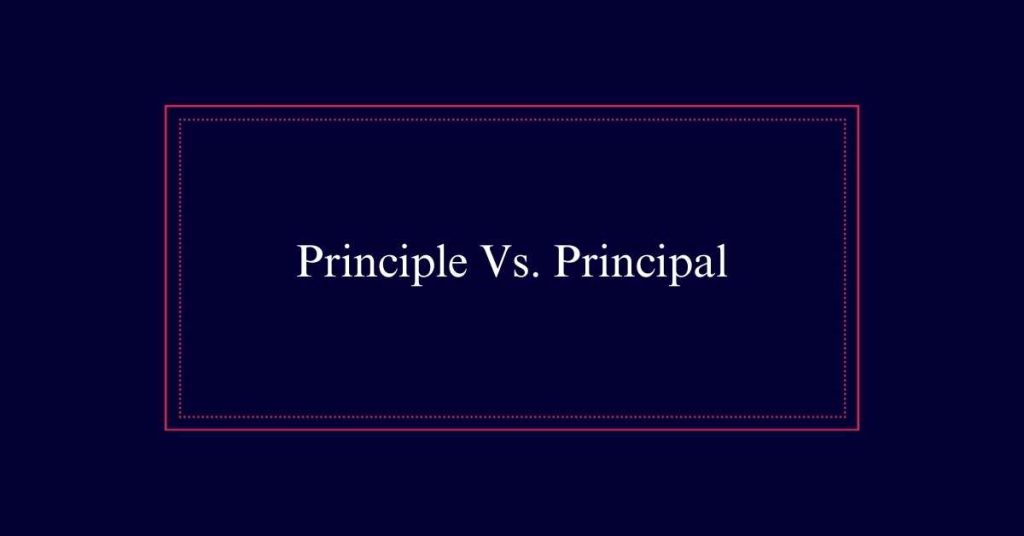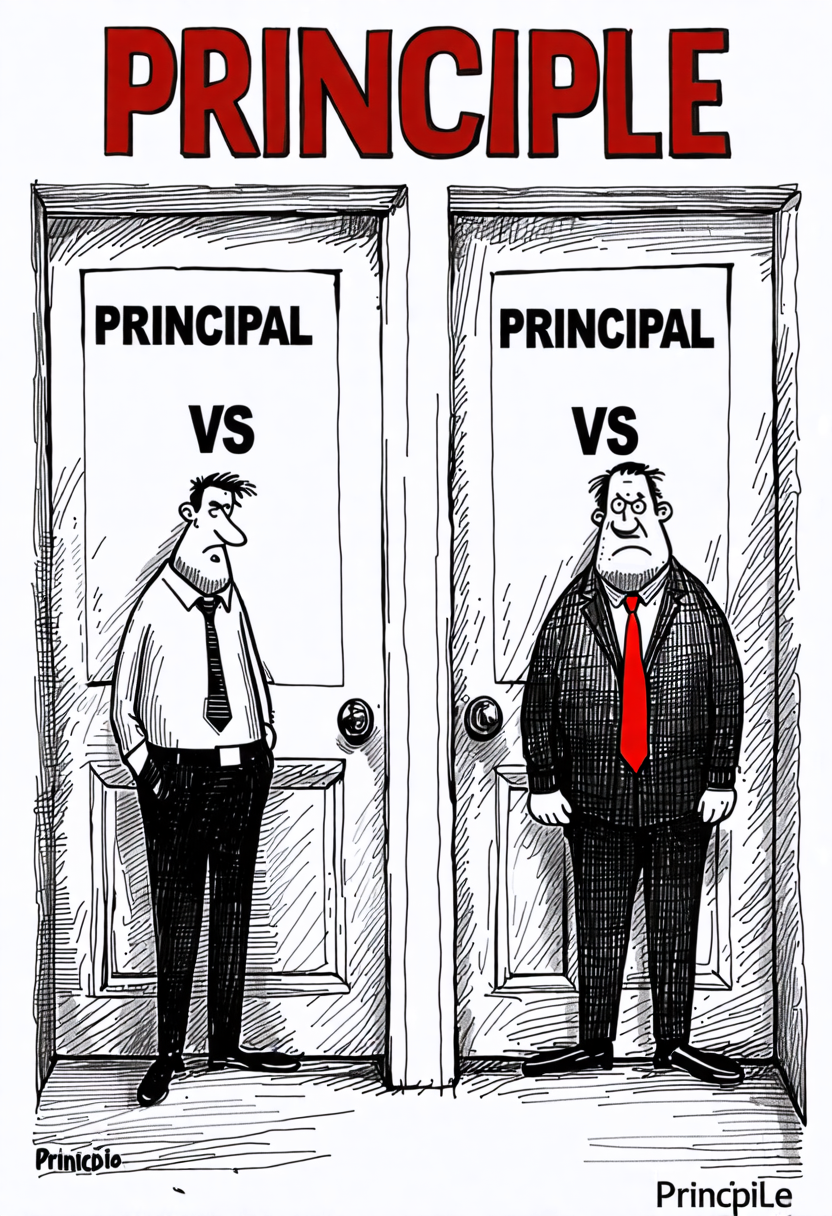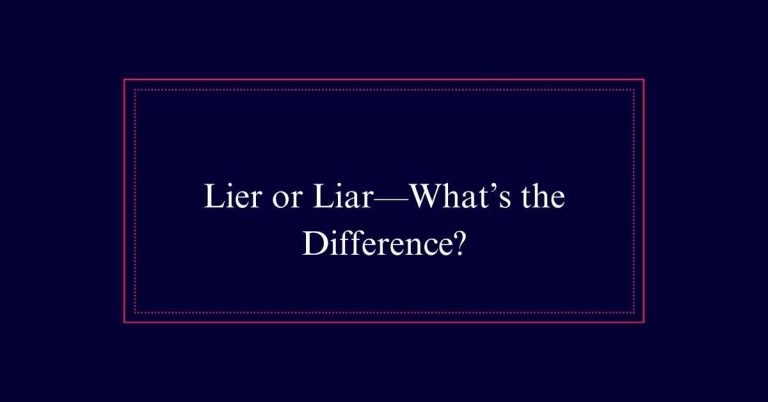Principle Vs. Principal
The words ‘principle’ and ‘principal’ often cause confusion due to their similar pronunciation. ‘Principle’ is always a noun and refers to a fundamental truth or belief that guides behavior and thought, such as ethical or scientific principles. ‘Principal,’ on the other hand, can be a noun or an adjective. As a noun, it denotes the head of a school or a key figure in an organization. As an adjective, it means first in order of importance, like the principal reason.
Understanding “Principle”
To understand the term ‘principle,’ it is essential to recognize that it is always used as a noun. A principle refers to a fundamental truth or belief that guides behavior and thought. It is a core value or rule that individuals or organizations adhere to, shaping decisions and actions.
For example, honesty can be a principle that dictates how a person interacts with others. Principles are often seen in moral or ethical contexts but can also guide scientific understanding. In science, principles explain natural phenomena, like the principle of gravity.

Definition of “Principle”
A principle is a fundamental truth or belief that acts as a foundation for behavior and thought. It serves as a guiding rule or standard that informs and shapes decisions. Principles can be moral or ethical guidelines, or scientific laws explaining phenomena. They are abstract but practical, helping individuals and societies function cohesively.
Here is a table to illustrate three main aspects of a principle:
| Aspect | Description | Example |
|---|---|---|
| Moral | Guides ethical behavior | Honesty |
| Scientific | Explains natural phenomena | Gravity |
| Practical | Directs day-to-day decisions | Efficiency in work |
Examples of “Principle”
In various contexts, principles serve as essential guidelines that shape behavior and decision-making. These fundamental beliefs and rules help individuals and organizations navigate complex situations.
Examples of principles include:
- Ethical Principles: These include honesty, integrity, and fairness. They guide moral conduct.
- Scientific Principles: Laws such as gravity or thermodynamics that explain natural phenomena.
- Management Principles: Concepts like delegation and accountability that improve organizational efficiency.
- Legal Principles: Doctrines such as ‘innocent until proven guilty’ that guarantee justice.
Understanding “Principal”
‘Principal’ can denote the head of a school or the most important element in a particular context. As a noun, it refers to the leader of an educational institution or a key person in a business. As an adjective, it signifies something of primary importance, such as the main reason for an event or the initially invested amount in finance.
| Context | Usage | Example |
|---|---|---|
| Education | Noun | The school principal |
| Business | Noun | Principal partner in a firm |
| Importance | Adjective | Principal cause of the problem |
| Finance | Adjective | Principal amount invested |
Definition of “Principal”
The term ‘principal’ encompasses both noun and adjective forms, each with distinct meanings. As a noun, ‘principal’ often refers to the person in charge of a school or an individual with significant authority in a business. As an adjective, it describes something of utmost importance or the original amount of money invested.
- Noun Form:
- Head of a school
- Key figure in a business
- Adjective Form:
- Most important element
- Initial sum of money in financial contexts
Examples of “Principal”
A school’s principal plays a significant role in shaping the institution’s culture and policies. The term “principal” can also refer to the main amount of money invested or borrowed, separate from interest. Additionally, it is used to describe someone in a leading position within an organization. Below is a table illustrating the different uses of “principal”:
| Context | Example | Explanation |
|---|---|---|
| School | The principal of the school | Head of the educational institution |
| Finance | The principal amount | Initial sum of money invested or borrowed |
| Business | A principal partner | Leading or managing partner of a firm |
| Adjective | Principal objective | Most important aim |
| Legal | Principal in a crime | Main perpetrator |
Latin Roots
Although both ‘principle’ and ‘principal’ share Latin origins, their distinct meanings have evolved from different roots. ‘Principle’ comes from the Latin word *principium*, meaning ‘beginning’ or ‘foundation.’ This reflects its use as a fundamental truth or guideline.
Meanwhile, ‘principal’ derives from *principalis*, meaning ‘chief’ or ‘first,’ emphasizing its role as a leading or primary entity.
Both trace back to princeps Meaning ‘first’ or ‘chief.’
Distinct applications: ‘Principle’ as a rule or belief, ‘principal’ as a person or primary importance.
Pronunciation Guide
Despite their distinct meanings, ‘principle’ and ‘principal’ are pronounced identically as (PRIN-suh-pul). This pronunciation similarity often leads to confusion in both spoken and written English.
Understanding the phonetic structure can help mitigate this issue. Both words start with the same ‘prin’ sound, followed by a schwa (the unstressed vowel sound ‘uh’). They end with the same ‘pul’ sound, making them homophones.
This identical pronunciation is why context becomes important when distinguishing between the two. For instance, in a sentence, the role of the word—whether it serves as a noun or an adjective—will offer clues to its correct usage. Therefore, paying attention to surrounding words is essential for proper understanding.
Common Confusions
Many people struggle to differentiate between ‘principle’ and ‘principal’ due to their identical pronunciation and similar spelling. This confusion is common but can be clarified by understanding their distinct uses:
- ‘Principal’ as a noun: refers to the head of a school or a key person in a business.
- ‘Principal’ as an adjective: means the most important or primary.
- ‘Principle’ as a noun: denotes a fundamental truth or a rule guiding behavior.
- ‘Principle’ in scientific context: refers to a natural law or basic truth explaining how something works.
Quick Reference Chart
A quick reference chart can help clarify the distinct uses of ‘principle’ and ‘principal’.
- Principle: Always a noun. Refers to a fundamental belief, rule, or truth. Example: ‘She follows the principle of honesty.’
- Principal: Can be a noun or adjective. As a noun, it means the head of a school or main figure. Example: ‘The principal gave a speech.’ As an adjective, it means the most important. Example: ‘The principal reason for the decision.’
Frequently Asked Questions
How Can Mnemonic Devices Help Differentiate ‘Principle’ and ‘Principal’?
Mnemonic devices help differentiate “principle” and “principal” by using simple associations. Remember “principal” as “your pal,” referring to a school leader. For “principle,” think of a rule or belief, as in “rule of thumb.”
Are There Any Idioms or Phrases That Use ‘Principle’ or ‘Principal’?
Yes, there are idioms and phrases using “principle” or “principal.” Examples include “in principle,” meaning theoretically, and “principal amount,” referring to the original sum of money invested or lent. These phrases clarify their distinct meanings.
Can ‘Principal’ Ever Be Used as a Verb in English?
The term “principal” cannot be used as a verb in English. It functions solely as a noun or adjective, referring to someone in charge, a main amount, or something of primary importance.







